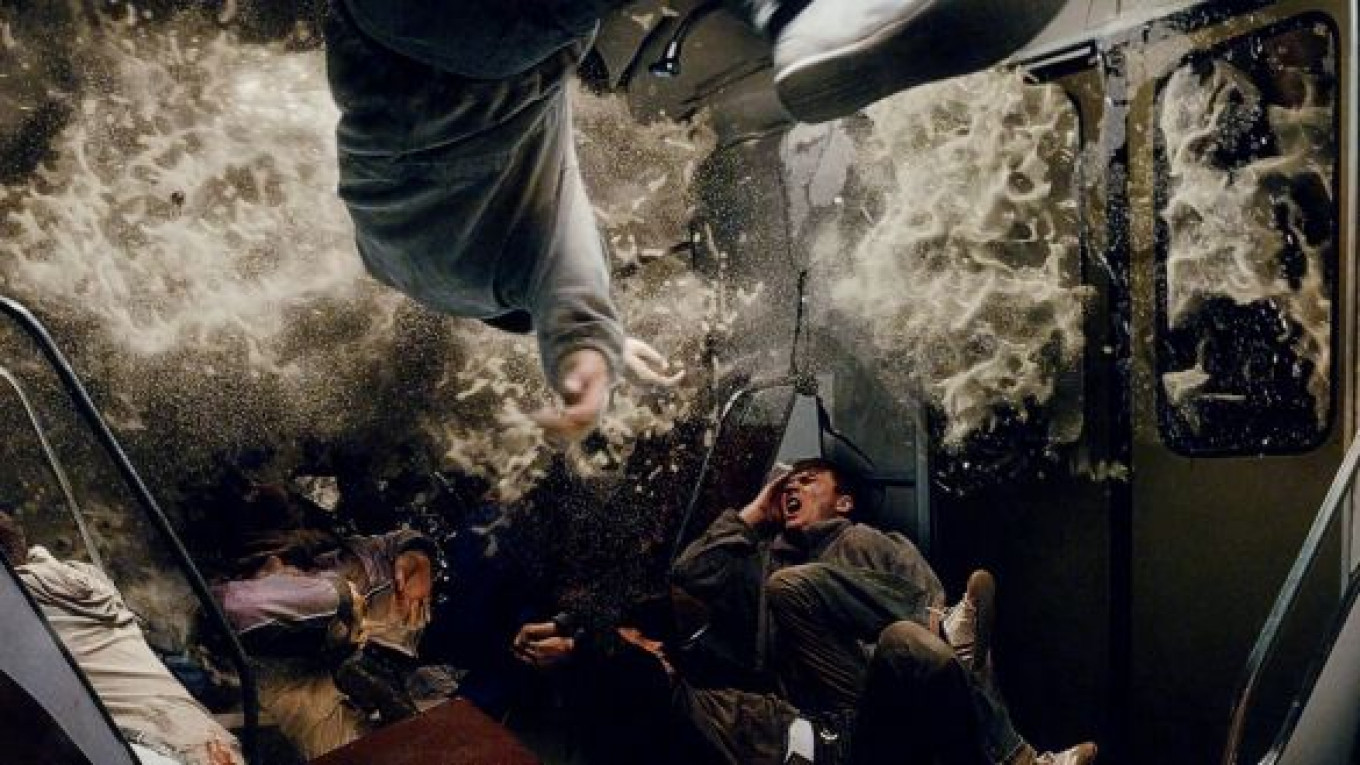You can tell a lot about a movie from its premiere’s venue. “Metro,” the most recent production of Igor Tolstunov, was held at Oktyabr, Moscow’s equivalent of the Grauman’s Chinese Theater in Los Angeles, while “Entropy” premiered at 35MM, a small indie theater catering to a mostly hipster crowd.
At Oktyabr, Tolstunov introduced director Anton Megerdichev, who in turn introduced about 30 people, actors and film crew, all standing on a giant stage that Oktyabr is famous for.
The audience held their breath when Svetlana Khodchenkova mounted the steps, wearing a short beige dress. She looked like she just stepped out of the movie, most of which she spent running around Moscow in something equally fashionable.
In the movie, Khodchenkova plays a married woman who is having an affair with her former classmate turned real estate mogul (Anatoly Bely), while her husband (Sergei Puskepalis) is slaving away for a joke of a salary as a surgeon at a local hospital.
The plot is rather strained: What are the odds of one woman’s husband, lover and daughter ending up in the same train car before it crashes due to the flooding of a tunnel?
The dialogue and acting are also a bit over the edge, but that’s beside the point. “Metro” is a genre movie, and as far as disaster films go, it’s a pretty good one.
Water flooding the tunnels is completely believable, and it will scare the hell out of you. The most impressionable viewers will probably have trouble using the subway for some time. The audience empathized with the characters, clapping each time they got away from imminent danger.
“Metro” is playing in theaters all over the city.
“Entropy” is about a group of bohemians traveling to the countryside to await the apocalypse. They squat in someone’s semifinished mansion and drink, philosophize and attempt to make a movie, the footage of which is what viewers are actually seeing.
Without giving much away, I can say there is a political aspect to the movie. As the movie starts, the viewers are a bit perplexed as to why the characters are expecting apocalypse in the summer when it’s scheduled for December.
But then we see a motorcade proceed through the empty streets of central Moscow and realize it’s meant to be May 2012, the day of President Vladimir Putin’s inauguration.
The three main characters are played not by professional actors, but by real life bohemians.
They essentially play themselves: Ksenia Sobchak is the tough producer Pasha; Valeria Gai Germanika is the successful director Gera; and Denis Polyakov is a socialite with ambiguous sexuality and equally ambiguous cinematic aspirations. There’s also Yevgeny Tsyganov playing a village drunk who balances out their craziness.
The dialogues are to a large extent improvised and hilarious. The movie’s director, Maria Saakyan, said the movie is “a statement on the current situation in our society, the plot only facilitates that statement.”
You can still catch “Entropy” at Pyat Zvyozd-Novokuznetskaya (16 Bolshoi Ovchinnikovsky Pereulok).
Another independent movie largely overlooked by both critics and audiences, “Vsyo Prosto” (It’s All Simple) by Sonya Karpunina, premiered in December and played only in a handful of theaters for a couple of weeks.
Karpunina is a student of one of the most prominent Russian directors, Sergei Solovyov, and wrote the screenplay and played the key role in one of his most recent movies, “Odnoklassniki” (Classmates).
In “Vsyo Prosto” Karpunina simultaneously juggled the roles of screenwriter, director and leading actress. It’s a movie that is hard to put into a genre pigeonhole.
At times it seems like a romantic comedy, then suddenly it’s a bitter satire on our generation, and then it dissolves into drama and goes back to romcom. Karpunina said she doesn’t like categorizing her movies. She believes a movie can be either interesting or not.
“Vsyo Prosto” is definitely the former, telling the story of a young Russian girl (played by Karpunina herself) who is studying in London and comes to Moscow to visit her boyfriend only to find out that he’d been unfaithful. The girl then embarks on a series of adventures with her old friend (Agnia Kuznetsova) and falls for a young film director (played by Karpunina’s real life husband Klim Shipenko).
Karpunina said the plot was influenced by real stories from her life and the lives of her friends. For instance, one of the central plot lines revolves around the ring that Karpunina’s character finds under her boyfriend’s bed, and it’s in fact something that happened to her friend Yulia Solomonova, who also happens to be the author of one of the songs on the movie’s terrific soundtrack.
“We were not trying to make an art house movie, just a movie that people would enjoy,” Karpunina has said.
“Vsyo Prosto” does have wide appeal. Being young and reckless and trying to find love and your own place in life are eternal themes and will always find their audience. Let’s just hope the Russian movie industry will stop deciding for us what we will and won’t like.
Contact the author at [email protected]
A Message from The Moscow Times:
Dear readers,
We are facing unprecedented challenges. Russia's Prosecutor General's Office has designated The Moscow Times as an "undesirable" organization, criminalizing our work and putting our staff at risk of prosecution. This follows our earlier unjust labeling as a "foreign agent."
These actions are direct attempts to silence independent journalism in Russia. The authorities claim our work "discredits the decisions of the Russian leadership." We see things differently: we strive to provide accurate, unbiased reporting on Russia.
We, the journalists of The Moscow Times, refuse to be silenced. But to continue our work, we need your help.
Your support, no matter how small, makes a world of difference. If you can, please support us monthly starting from just $2. It's quick to set up, and every contribution makes a significant impact.
By supporting The Moscow Times, you're defending open, independent journalism in the face of repression. Thank you for standing with us.
Remind me later.






